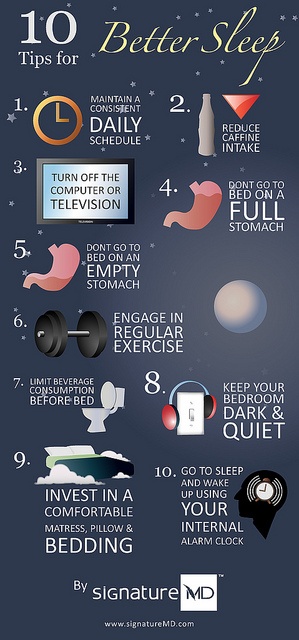If you google "Sleep Hacks" you'll get a lot of good answers.
Start by tracking your sleep with My Sleep Bot for Android or iPhone, or Sleep101 for iPhone. This will help you know more precisely what does and doesn't work. Each app also provides a lot more helpful features for better sleep.
Turn off bright lights within an hour before going to bed. Your body is trained to wake up with the sun and go to sleep when it's dark. Also decrease as much light and sound as you can while you sleep.
Condition your body with the environment. Only use your bed for sleeping, nothing else. Once you train your body to associate your bed with sleeping, it'll have a better chance of going to sleep.
Condition your body with routine. Always have the same routine for going to bed. If you can train your body that the same routine happens followed by sleep, the body will follow the pattern and be primed for sleep. This is classical conditioning. Reading, stretching, breathing exercises, mindfulness, meditation, etc are all excellent ways to help relax before bed.
As a personal example, I made a CD with some really soothing music that I would listen to every night. Because it conditioned me, I went from taking 20-30 minutes to get to sleep to 10-12 minutes. If I heard any of those songs during the day, I was so conditioned that my entire body would get really relaxed and I'd want to go to sleep. It was amazing.
Psychology Richard Wiseman used the best research available to make the most relaxing music possible. You can check out the video about it along with the link to it here: https://www.youtube.com/watch?v=hqvD8H32wYA
Caffeine not only increases energy, it also increases tension. Although caffeine can be alright early in the day, avoiding caffeine altogether will decrease tension, stress, and help you relax more effectively. Which in turn will help with sleep at night.
Eat healthy and exercise during the day. Getting your body what it needs and building in better rhythms during the day will help it sleep better at night.
Here's a list of 40 awesome sleep hacks from optimizing psychology, diet, using technology, and much more: http://www.scribd.com/doc/3932344/40-Sleep-Hacks-The-Geek-s-Guide-to-Optimizing-Sleep
And here's another resource which supports some of the tips above and provides some more: http://www.huffingtonpost.com/2014/03/17/better-sleep-tips-best_n_4958036.html
Best of luck!
Tips in a visual form:

